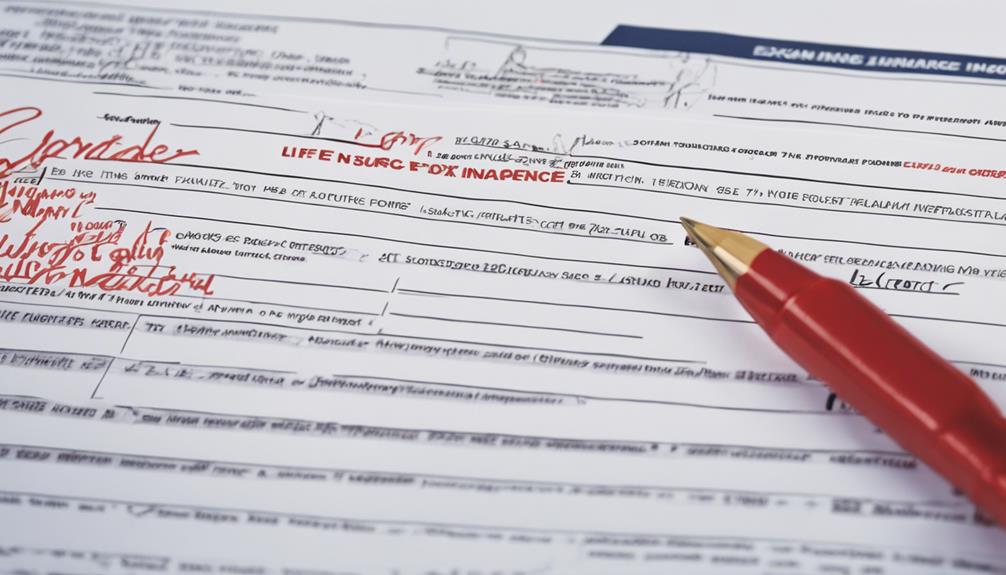Updating your life insurance beneficiary after a divorce can feel like navigating through a complex maze of legal intricacies. Each decision, from adjusting coverage amounts to selecting new beneficiaries, requires careful consideration.
But what happens if you overlook this crucial step in your post-divorce life? Let's shed light on the significance of this process and offer guidance on how to ensure your life insurance aligns with your current circumstances.
Key Takeaways
- Promptly update beneficiaries to ensure benefits reach intended recipients after divorce.
- Choose new beneficiaries carefully to align with current wishes and avoid unintended consequences.
- Secure alimony and child support obligations with life insurance coverage until children reach adulthood.
- Consult legal and financial professionals for guidance on updating beneficiaries accurately post-divorce.
Importance of Updating Beneficiaries
Updating beneficiaries promptly after a divorce is essential to ensure that your life insurance benefits are directed to the intended recipients. Failure to update beneficiaries can lead to your ex-spouse receiving the benefits, which may not align with your wishes post-divorce. It's crucial to review and adjust your life insurance policy to reflect your current circumstances accurately.
By naming new beneficiaries after a divorce, you can protect your assets and ensure that your chosen beneficiaries receive the benefits as intended.
Consulting legal and financial professionals when updating your life insurance beneficiaries post-divorce is highly recommended. These professionals can provide valuable guidance on the legal aspects of changing beneficiaries, ensuring that your wishes are carried out effectively. They can also offer insights into how to best protect your assets and make informed decisions regarding your life insurance policy.
Take proactive steps to update your beneficiaries promptly to safeguard your financial future and provide for those you care about most.
Steps to Remove Ex-Spouse

To remove an ex-spouse as a beneficiary from your life insurance policy after a divorce, the initial step is to consult your divorce decree for any specific instructions or obligations related to beneficiaries.
Once you have clarity from the decree, contact your life insurance provider to request a beneficiary change form. Fill out this form accurately, ensuring you clearly specify the removal of your ex-spouse as the beneficiary.
It's essential to provide any necessary supporting documentation, such as a copy of your divorce decree, to the insurance company along with the form. This documentation helps the insurance company process your request smoothly.
After submitting the form and required documents, verify that the beneficiary change has been processed and updated in your policy documents. Ensuring this update is in place safeguards your wishes and guarantees that the correct beneficiaries receive the benefits in the future.
Naming New Beneficiaries
Considering the significant life changes that often accompany divorce, it becomes essential to carefully select new beneficiaries for your life insurance policy to ensure your wishes are accurately reflected.
In the aftermath of a divorce settlement, updating your life insurance beneficiary is crucial. State laws may automatically remove your ex-spouse as a beneficiary post-divorce, but it's wise to proactively change the beneficiary to avoid any unintended consequences. Common choices for new beneficiaries include children, a new partner, a trust, friends, or a charity.
When selecting beneficiaries, it's essential to consider who'll provide financial support and manage the assets effectively. You may also want to explore the option of designating an irrevocable beneficiary for added security.
Considerations for Children as Beneficiaries

When addressing the consideration of children as beneficiaries in life insurance policies after a divorce, it's crucial to navigate potential legal restrictions and ensure proper management of benefits for minor beneficiaries.
Naming minor children as direct beneficiaries may not be advisable due to these legal restrictions. Instead, designating a custodian or trust for minor children as beneficiaries can ensure the proper handling of benefits.
In cases involving financial obligations towards minor children post-divorce, court-ordered life insurance may be required. Communication and compliance with ex-spouses and legal teams are essential for maintaining these court-ordered life insurance policies.
It's important to consider the long-term financial security and well-being of minor children when updating life insurance beneficiaries after divorce. By prioritizing the welfare of minor children through appropriate beneficiary designations and compliance with any court orders, you can ensure their financial stability and protection.
Addressing Alimony and Support Obligations
Securing alimony and support obligations through life insurance post-divorce is a critical financial strategy to ensure continued financial stability for all parties involved. When addressing alimony and support obligations in the context of life insurance, there are several key considerations to keep in mind:
- Protecting Alimony Payments: Life insurance can secure alimony payments in the event of the paying spouse's death, guaranteeing that financial support continues as per the divorce agreement.
- Child Support Obligations: Higher-income spouses may be required to purchase a life insurance policy to protect child support obligations post-divorce, ensuring financial support for the children.
- Coverage Duration: Policies should be structured to provide coverage until children reach adulthood, safeguarding their financial stability even if the paying parent passes away.
- Financial Commitments: Protecting alimony and child support through life insurance is crucial in various custody and income scenarios to ensure that financial commitments are met even in unforeseen circumstances.
Updating beneficiaries post-divorce is essential to align with current circumstances and guarantee that the intended recipients receive the benefits they're entitled to.
Frequently Asked Questions
How Do I Change the Beneficiary of My Life Insurance Policy After Divorce?
We contact our insurance provider post-divorce to update our life insurance beneficiary. We request a beneficiary change form and follow their process. We consider new beneficiaries like kids, a trust, or a new partner.
Does Divorce Override Beneficiary Designation?
Divorce does not automatically override beneficiary designations on life insurance policies. It's essential to update beneficiaries post-divorce to ensure assets go to intended recipients. Some state laws may revoke an ex-spouse as a beneficiary.
What Happens to a Life Insurance Policy After Divorce?
After divorce, life insurance policies may need updating to ensure the intended beneficiaries receive benefits. State laws may revoke the former spouse as a beneficiary. Review and adjust designations accordingly to reflect post-divorce preferences and obligations.
Is My Ex Wife Still Listed as a Beneficiary on My 401k?
We must ensure our beneficiaries are current on all financial accounts, like our 401k. Failing to update after a divorce could lead to unintended consequences. Consult with a professional to understand the process for making changes.
How Can Divorce Affect Life Insurance Beneficiaries and How to Update Them?
When going through a divorce, it’s vital to review and update life insurance beneficiaries. Failing to do so could result in unintended consequences, such as ex-spouses receiving benefits. To ensure that the intended beneficiaries receive the benefits, the policyholder should promptly update their policy. There are many ways to cope with divorce, and this is one important step in the process.
Conclusion
Updating your life insurance beneficiary after divorce is crucial to ensure your wishes are carried out. By carefully reviewing your policy, consulting a lawyer, and considering all factors, you can avoid any potential complications down the line.
Remember, making these changes is like giving your loved ones a golden ticket to financial security and peace of mind in the future. So don't delay, take action now to protect your assets and provide for those who matter most.










